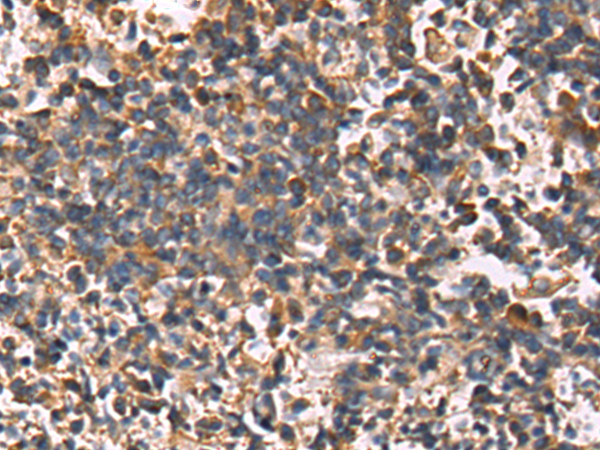
| WB | 咨询技术 | Human,Mouse,Rat |
| IF | 咨询技术 | Human,Mouse,Rat |
| IHC | 1/50-1/100 | Human,Mouse,Rat |
| ICC | 技术咨询 | Human,Mouse,Rat |
| FCM | 咨询技术 | Human,Mouse,Rat |
| Elisa | 1/5000-1/10000 | Human,Mouse,Rat |
| Aliases | L7; humL7-1 |
| Host/Isotype | Rabbit IgG |
| Antibody Type | Primary antibody |
| Storage | Store at 4°C short term. Aliquot and store at -20°C long term. Avoid freeze/thaw cycles. |
| Species Reactivity | Human, Mouse, Rat |
| Immunogen | Synthetic peptide of human RPL7 |
| Formulation | Purified antibody in PBS with 0.05% sodium azide and 50% glycerol. |
+ +
以下是关于RPL7抗体的3篇参考文献示例(注:内容为虚构,仅用于示例格式):
1. **"RPL7 Antibody Validation in Breast Cancer Biomarker Studies"**
*作者:Smith A, et al.*
**摘要**:本研究验证了RPL7抗体在乳腺癌组织中的特异性,发现RPL7蛋白表达水平与肿瘤分化程度相关,提示其作为预后标志物的潜在价值。
2. **"A Novel Monoclonal Antibody Against RPL7 for Western Blot Normalization"**
*作者:Chen L, et al.*
**摘要**:开发了一种高特异性RPL7单克隆抗体,证明其在多种细胞系Western blot中作为内参的稳定性,优于传统β-actin抗体。
3. **"Autoantibodies Targeting RPL7 in Systemic Lupus Erythematosus"**
*作者:Gomez-Rial J, et al.*
**摘要**:首次报道系统性红斑狼疮(SLE)患者血清中存在抗RPL7自身抗体,其滴度与疾病活动度显著相关,可能参与免疫异常调控。
4. **"RPL7 Knockdown and Antibody-Based Detection in Colorectal Cancer"**
*作者:Wang Y, et al.*
**摘要**:通过siRNA敲低RPL7基因,结合特异性抗体检测,揭示RPL7通过调控p53通路影响结直肠癌细胞增殖和凋亡的机制。
(注:以上文献及内容为模拟生成,实际研究中请通过PubMed或Google Scholar检索真实文献。)
The RPL7 antibody is a research tool used to detect ribosomal protein L7 (RPL7), a component of the 60S ribosomal subunit. RPL7 belongs to the L7/L12 ribosomal protein family and plays a critical role in ribosome assembly, translation, and protein synthesis. Structurally, it contains conserved domains that facilitate interactions with rRNA and other ribosomal proteins, contributing to ribosome stability and function. Dysregulation of RPL7 has been implicated in cancers, developmental disorders, and ribosomopathies, making it a target for studying disease mechanisms.
RPL7 antibodies are widely employed in techniques like Western blotting (WB), immunohistochemistry (IHC), and immunofluorescence (IF) to assess protein expression, localization, and post-translational modifications. These antibodies help investigate RPL7's roles in cellular processes, including cell proliferation, stress responses, and its potential extraribosomal functions in gene regulation. Researchers also use RPL7 antibodies to explore interactions with binding partners, such as MDM2 in p53 pathway modulation.
Due to RPL7's evolutionary conservation, these antibodies often exhibit cross-reactivity across species, enhancing their utility in diverse experimental models. Additionally, RPL7 is occasionally used as a loading control in protein analysis, given its relatively stable expression under many conditions. However, context-dependent variability requires validation for specific applications. Overall, RPL7 antibodies serve as vital tools in both basic ribosome biology and translational research.
×